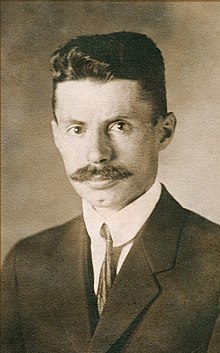Vyacheslav_Lypynsky
Vyacheslav Lypynsky
Ukrainian historian, activist, and political theorist (1882–1931)
Vyacheslav (Viacheslav) Kazymyrovych Lypynsky[lower-alpha 1] (5 April 1882 — 14 June 1931) was a Ukrainian historian, social and political activist, an ideologue of Ukrainian conservatism. He was also the founder of the Ukrainian Democratic–Agrarian Party. Under the government of Hetmanate, he served as the Ukrainian ambassador to Austria.
This article includes a list of references, related reading, or external links, but its sources remain unclear because it lacks inline citations. (May 2023) |
